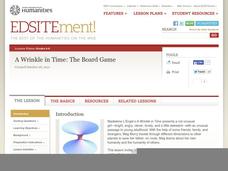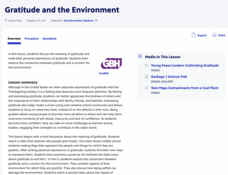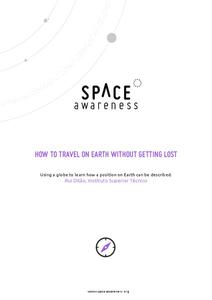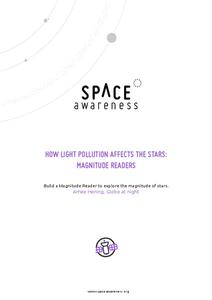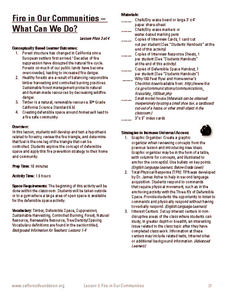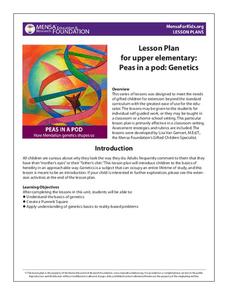Chicago Botanic Garden
Micro-GEEBITT Climate Activity
A truly hands-on and inquiry based learning activity bridges all the lessons in the series together. Beginning with a discussion on average global temperatures, young meteorologists use real-world data to analyze climate trends in order...
National Endowment for the Humanities
A Wrinkle in Time: The Board Game
Tackle some big questions about A Wrinkle in Time by Madeleine L'Engle with a board game project. As learners brainstorm for and complete their board games, they consider what helps and hinders Meg on her journey and why she succeeds in...
PBS
Gratitude and the Environment
A class discussion begins a two-part lesson about gratitude and the environment. In part one, learners watch a video then share their feelings about its most memorable moment. Delving deep into the meaning of gratitude, scholars create...
Curated OER
Seed to Soup Organic Garden
Have your young biologists visit decomposition stations as they explore the process of organic material. This activity involves some set-up as kids will be visiting 13 desks to collect colored paper each representing a different element...
Space Science Institute
The "All American" Eclipse Guide
Are you ready for the biggest astronomical event of the year? More importantly ... are you ready to share it with your scholars? Use a presentation filled with facts and diagrams to make sure everyone in class understands the importance...
Space Awareness
How To Travel On Earth Without Getting Lost
Have you ever wanted to travel the world? Take a virtual trip with a geography lesson that uses longitude and latitude, the position of the sun, an astronomy app, and a classroom globe.
Baylor College
How Do We Use Water?
Send youngsters home to survey how they use water in their homes. Then bring them together to discuss which uses are essential for our health and which are not. A helpful video offers teaching tips for this lesson, and a presentation...
Wild BC
Bearly Any Ice
After reviewing food chains, your class members participate in an arctic predator-prey game that exemplifies the impact of climate change of food availability. If you are in a hurry, skip this instructional activity, but if you have the...
Space Awareness
How Light Pollution Affects the Stars: Magnitude Readers
Did you know light can decrease visibility? Light pollution absolutely makes it more difficult to see stars. Scholars build a simple magnitude reader to determine the magnitude of stars. They use these data to estimate the impact of...
Forest Foundation
Fire - How Does it Relate to You?
Forest fires can be a necessary step in keeping a forest healthy, but what happens when they get out of control? Learners investigate the causes and effects of forest fires in two specific areas, culminating in a report about the ways...
Safe Drinking Water Foundation
To Filter or Not to Filter
Drinking clean water can be taken for granted. Explore the process and high cost of filtering water with a water pollution and filtration activity. Young scientist build a filtration system to filter polluted water, examine the economics...
NEED Project
Calibrating Thermometers
Engage young scientists in the upper-elementary and middle school grades with this collection of simple experiments. Whether you're teaching about heat transfer, density, or potential energy this resource has a lab for you.
Forest Foundation
Fire in Our Communities - What Can We Do?
Learn about defensible space and renewable resources with a lesson about forest fires. After exploring the ways that humans have impacted the environment, kids conduct mock interviews about differing points of view in the conservation...
Curated OER
Ecosystems
A critical look into the structure and function of ecosystems is here for young learners as a series of lessons and worksheet activities. Topics covered include land-based and marine ecosystems, connections to the water cycle, food webs,...
NOAA
Satellite Communications
How do satellites communicate? What types of satellites orbit Earth? Discover and mimic the way satellites communicate between two points in a hands-on activity that has pupils using mirrors, flashlights, and marbles.
NOAA
Invent a Robot!
Wait til your class gets their hands on this! Aspiring engineers design a working robotic arm in the fifth and final installment in a series of ocean exploration lessons. Pupils learn about the use of underwater robots in ocean...
Melissa Institute for Violence Prevention and Treatment
Concept Muraling
Concept muraling helps learners improve their comprehension of a text by giving them a way to organize their understanding of the key concepts in that text. Introduce readers to this process with a carefully scaffolded lesson that models...
Curated OER
Crazy for Cubes: Art and Science
Learners discuss Sol LeWitt and conceptual art, then analyze the differences in expressing a concept through model-based inquiry and aesthetic art criticism. They develop a geometric, scientific, or mathematical concept, then create an...
MENSA Education & Research Foundation
Peas in a Pod: Genetics
Can peas have grandparents? Learn about inherited traits and heredity with a set of activities focused on Mendelian genetics. As your class learns about the process of passing traits along in Punnett squares, they take on the role of...
United Nations
Compost Monitor Training
What should go in the trash, and what can be composted? Guide your young conservationists through the process of composing their trash with a activity about the different ways we can dispose of garbage. Using a trash bag with clean...
Foundation for Water & Energy Education
What is the Water Cycle? Activity B
Curious physical scientists follow a lesson on the properties of water with this lesson on distillation. They observe a miniature water cycle model that filters dirty water into clean water. These two lessons combined are an enriching...
Scholastic
Back from the Dead
If you could bring back one extinct animal, what would it be? That is the question your class will ponder. Your budding scientists read a passage, follow a cloning timeline, and review a diagram about the process of reviving a woolly...
Agriculture in the Classroom
A Rafter of Turkeys
How did that turkey get from the early Aztec culture to your table? Learn about the history of wild and domesticated turkeys in North America, as well as their inclusion in Thanksgiving traditions, with a two-part agricultural science...
University of Minnesota
Close-up of the Nervous System
Make sure your class gets on your nerves! Learners of all ages practice peering into the nervous system to see what's inside. Groups examine prepared slides of mammalian nervous system tissues, all while gaining microscope skills. The...
Other popular searches
- 4th Grade Science Project
- Physical Science Projects
- Science Project on Pulleys
- Science Project Volcano
- Science Project Gravity
- Science Project Ideas
- Forensic Science Project
- Science Fair Project Ideas
- Rock Science Project
- Science Project Food
- Science Project Terrarium
- Science Fair Project Data



